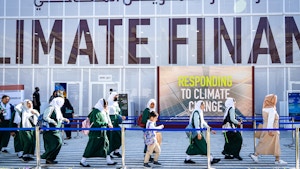The Azerbaijan COP29 presidency outlined its plans for climate action that governments must agree on ahead of the United Nations summit in Baku in November, including its commitment to limiting global warming below 1.5 degrees Celsius, based on the Paris Agreement.
“Failure to meet the goal will lead to loss of homes and inhabitants. It would be a devastating and existential threat especially to least developed countries and small island states,” COP29 president Mukhtar Babayev said in a speech delivered at the Petersberg Climate Dialogue in Berlin on Thursday.
“Our previous promises now need to be delivered, not reinterpreted. Fulfilled, not re-negotiated. Everyone has a duty to make sure their actions match their words,” said Babayev, who is Azerbaijan’s Minister of Ecology and Natural Resources and a former executive for the country’s state-owned oil company.
But at the same conference, Azerbaijan president Ilham Aliyev told partcipants at the annual gathering of selected states as they prepare the ground for successful climate negotiations, that his government will defend the right of oil and gas producing nations to invest in the energy sector.
Burning fossil fuels for energy is the main source of the greenhouse gas emissions causing climate change. Global energy-related carbon dioxide emissions reached a new record high last year, according to analysis from the International Energy Agency.
“As a head of a country which is rich in fossil fuels, of course we will defend the right of these countries to continue investments and to continue production because it is needed. But at same time, countries with fossil fuels should be among those which demonstrate solidarity with respect to issues related to climate change,” Aliyev told the conference on Friday.
As the host of the next round of climate talks, Azerbaijan will oversee negotiations among nearly 200 countries on how to raise more finance to combat climate change and reduce the greenhouse gas emissions heating the planet.
“The defense of oil and gas expansion by the Azerbaijan President is completely contradictory to what should be expected from the COP Presidency,” said Lidy Nacpil, coordinator of the Asian Peoples Movement on Debt and Development (APMDD), a regional alliance of 50 member organisations and movements.
“It is a horrible foretelling of what will happen in COP29 on the critical and urgent task of a rapid, just and equitable fossil fuel phase out. Instead of moving forward we may be looking at a further stalling if not set back of the energy transition.”
By defending the necessity of oil and gas in an energy transition, it is likely that Azerbaijan as the one holding the COP29 presidency will follow a similar pattern as the United Arab Emirates last year when it hosted COP28, said John Leo Algo, national coordinator of Aksyon Klima Pilipinas, a climate action non-profit.
“By supporting actions that are not aligned with 1.5 degrees Celsius pathway, the world’s capacity to achieve the goals of the Paris Agreement raises the risk that the credibility of the COP29 talks would also be questioned, and its outcomes would likely again fall short of what the developing, vulnerable world needs to avoid the worst of the climate crisis,” Algo told Eco-Business.
Last year’s UN climate summit in the UAE ended with a global agreement calling for “transitioning away from fossil fuels” to reach net zero emissions by 2050. Many including small island states were dismayed that the commitment stopped short of a complete phase-out.
The new climate finance goal
Babayev also highlighted in his speech the new climate finance goal to be tackled during the November talks.
The new collective quantified goal (NCQG) that aims to address developing countries’ climate ambitions, is intended to be the successor to the previous US$100 billion goal set under the Paris Agreement in 2015, which has yet to be clearly achieved, despite its deadline being in 2020.
The details of the NCQG are still being debated among parties, but it must learn from the failures of the US$100 billion target, said Algo.
“The NCQG must respond to the growing needs of developing nations for climate action, which now runs into trillions of dollars. It should also cover the needed funds for averting or minimising loss and damage, in contrast to the previous goal’s focus only considering adaptation and mitigation,” he said.
Nacpil added that climate finance should be “new and additional” to the previous funds, and in the form of grants, not loans.
“Estimates show that developing countries need trillions per year for climate action. Without adequate, new and additional climate finance, it will be impossible to achieve a just transition to renewable energy, build resilience against climate impacts and address loss and damage, she said.





















